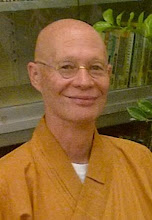Friday, December 31, 2010
“Yes!” to Life
Our aim in being a Buddhist is to achieve enlightenment. I must admit I have always been puzzled about this word in English as it has, for me at least, conveyed an intellectual pursuit which seems pretty hard to achieve. However, if we are to believe that the Buddha Shakyamuni was a perfect teacher I do not think for one moment even a good teacher would give something unachievable to learn for his students. So what exactly is this enlightenment?
The other day I was having lunch with some people whom I had not met before. One lady remarked that she thought Buddhists to be very dull and not enjoying life, sort of ‘wowsers’ in Australian vernacular. She further went on to add that she felt that Buddhists wasted their time in studying things that did not relate to practical living, “like making money”. I was not put out by these comments and observations as I have heard them before in varying terms but it left me wondering if as Buddhists we have failed to convey the message or allowed misunderstandings to go uncorrected.
When asked by one of his students, "Are you the messiah?"
"No", answered Buddha.
"Then are you a healer?"
"No", Buddha replied.
"Then are you a teacher?" the student persisted.
"No, I am not a teacher."
"Then what are you?" asked the student, exasperated.
"I am awake", Buddha replied.
“Awake”. In Sanskrit language this is what is meant by the word “Buddha” or “Bodhi”. In the Chinese Buddhist tradition, to which I belong to, the word for awakened is “Pu Ti”. The Chinese characters are菩提. The first character 菩 “PU”conveys the meaning of “Bodhisattva”. The second character 提 TI conveys the meaning of “lifting up” and is especially used in describing the upward or rising stroke in Chinese calligraphy.
The early Chinese Buddhist monks were extremely careful when translating the original Pali or Sanskrit language. Most Chinese Buddhist terms are transliteration, that is , they are copies of the sounds of the original language. However, in copying the sounds the early Chinese monks were very careful not only to choose a character that had a similar sound to the Sanskrit word but also to choose a character that conveyed the precise meaning. This is indeed masterful use of language and translation.
Being awakened has in it the sense of rising above the mundane world with the skill of a Bodhisattva. It is an awakening from a type of hoax to a reality of life that is beautiful. I deliberately did not write “awakening from a dream” as I have sometimes read. Some of our dreams are quite beautiful but the dream being referred to here is more of a nightmare! It is a hoax. This is conveyed in another Chinese word for enlightenment 启蒙 chi meng which means “awaken from being deceived.”
We are often deceived by popular culture that grasping, greed and violence is the norm, that it is OK. We know deep down that it isn’t. The more “things” we have and accumulate don’t make us any happier. In fact they can make us even more depressed. Anger doesn’t solve problems but only leads to violence. As Buddhists we have a way to rise up out of the quick sands of deception to a fuller more beautiful life.
Closely related to being awake is the idea of being “conscious”. The Chinese Buddhist term for consciousness is 覺悟 Jue Wu. The two characters convey the meaning of opening one’s eyes and suddenly understanding. The opposite of consciousness is unconsciousness which is a state of living “death”. Jue Wu is about being “alive” to life and having understanding. Understanding leads to skill and the leading of life with skillful means. It is about standing on the highest peak with the brisk wind blowing in your face even while faced with the struggles of daily living and being able to shout: “Yes!!” This is Buddhism! This is “enlightenment”. It is not about walking about with serious downcast faces and ignoring life or contemplating one’s navel rather it is about living life skilfully to the max!
I cannot help but feel deep sadness as I often take to the streets of Sydney observing expressionless and depressed faces wired to iPods, mere shells of human beings trying to make the best of life. Technology, no matter how useful it may be cannot give us deep happiness – the Bodhi Mind. The Bodhi Mind – the Awakened and Compassionate Mind – is only achievable through wisdom and being alive, alert and connected with daily life, being communicative and compassionate to those around us and practicing the teachings of the Buddha.
Being “Alive” is not hard to achieve in this very lifetime with applied learning and effort. The Pure Land is not just a place of nirvana we may attain at the end of our life. The Pure Land is not far from each and every one of us right in this present moment. We can achieve the skills then we can awaken in the morning each day and say to life: “Yes! I am Alive!”
Subscribe to:
Post Comments (Atom)



No comments:
Post a Comment